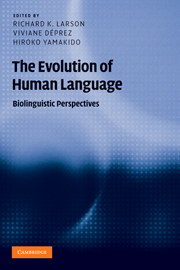Book contents
- Frontmatter
- Contents
- Figures
- Contributors
- Acknowledgments
- Introduction
- 1 The faculty of language: what is it, who has it, and how did it evolve?
- Part I Language architecture
- Part II Language and interface systems
- Part III Biological and neurological foundations
- Part IV Anthropological context
- Notes
- References
- Index
- References
1 - The faculty of language: what is it, who has it, and how did it evolve?
Published online by Cambridge University Press: 05 June 2012
- Frontmatter
- Contents
- Figures
- Contributors
- Acknowledgments
- Introduction
- 1 The faculty of language: what is it, who has it, and how did it evolve?
- Part I Language architecture
- Part II Language and interface systems
- Part III Biological and neurological foundations
- Part IV Anthropological context
- Notes
- References
- Index
- References
Summary
We argue that an understanding of the faculty of language requires substantial interdisciplinary cooperation. We suggest how current developments in linguistics can be profitably wedded to work in evolutionary biology, anthropology, psychology, and neuroscience. We submit that a distinction should be made between the faculty of language in the broad sense (FLB) and in the narrow sense (FLN). FLB includes a sensory-motor system, a conceptual-intentional system, and the computational mechanisms for recursion, providing the capacity to generate an infinite range of expressions from a finite set of elements. We hypothesize that FLN only includes recursion and is the only uniquely human component of the faculty of language. We further argue that FLN may have evolved for reasons other than language, hence comparative studies might look for evidence of such computations outside of the domain of communication (for example, number, navigation, and social relations).
If a martian graced our planet, it would be struck by one remarkable similarity among Earth's living creatures and a key difference. Concerning similarity, it would note that all living things are designed on the basis of highly conserved developmental systems that read an (almost) universal language encoded in DNA base pairs. As such, life is arranged hierarchically with a foundation of discrete, unblendable units (codons, and, for the most part, genes) capable of combining to create increasingly complex and virtually limitless varieties of both species and individual organisms. In contrast, it would notice the absence of a universal code of communication (Figure 1.1).
Information
- Type
- Chapter
- Information
- The Evolution of Human LanguageBiolinguistic Perspectives, pp. 14 - 42Publisher: Cambridge University PressPrint publication year: 2010
References
Accessibility standard: Unknown
- 22
- Cited by
